
Home
Services
About us
Blog
Contacts
App Controlled Coffee Makers: Custom Mobile App Development for Smart Brewing by A-Bots.com
1. Popular App Controlled Coffee Machines: Market Overview
2. The Rise of App Controlled Coffee Makers
3. Core Features of a Coffee Machine with App Control
4. Future of App Controlled Espresso Machines
5. Why Custom Development Matters — and How A-Bots.com Helps
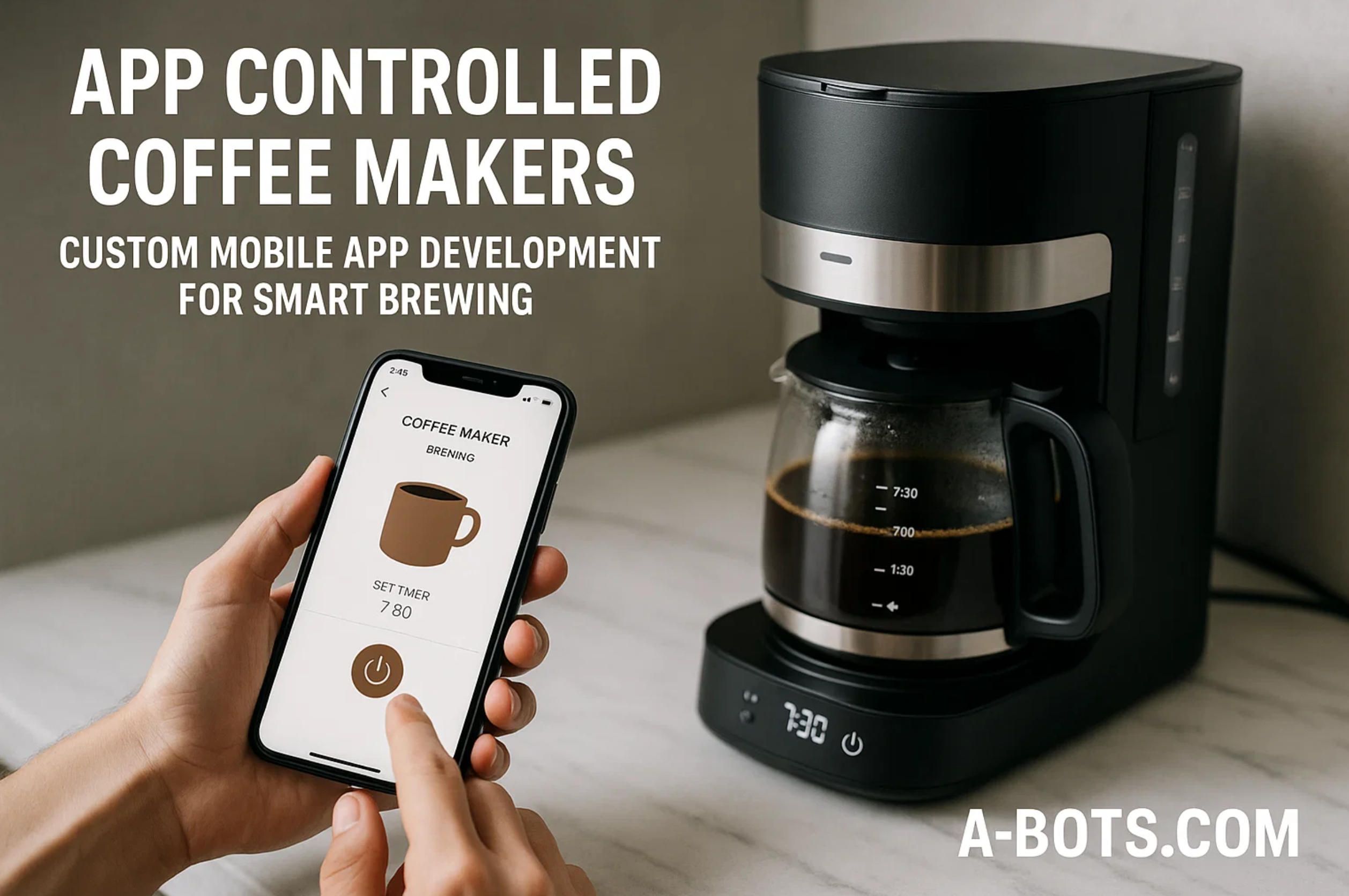
In today’s connected world, even the ritual of brewing coffee is being transformed by technology. From restaurants to home kitchens, consumers now expect their devices to be as smart and intuitive as their smartphones. This shift has fueled demand for the app controlled coffee maker — a new generation of machines that combine precision engineering with mobile convenience. But while the hardware is impressive, the real magic lies in the software: the mobile applications that allow users to personalize, automate, and control their coffee experience.
That’s where A-Bots.com comes in. As a global mobile app development company, A-Bots.com specializes in creating bespoke mobile apps for IoT and smart appliances, including coffee machines with app control and app controlled espresso machines. Whether it’s a simple Bluetooth interface or a cloud-connected ecosystem with AI-driven features, our team designs applications that not only connect machines to phones but also elevate the user journey — from scheduling a brew before waking up to monitoring machine health remotely.
For coffee machine manufacturers, startups, and restaurant technology providers, the opportunity is clear: the market is hungry for differentiation. Off-the-shelf software solutions rarely deliver the level of customization that brands need. With A-Bots.com, businesses can partner with experts who understand both the technical side of IoT integration and the customer side of UX design. The result is a mobile app that doesn’t just control a coffee maker from a phone — it creates a seamless, branded, and future-proof experience that keeps users engaged and loyal.
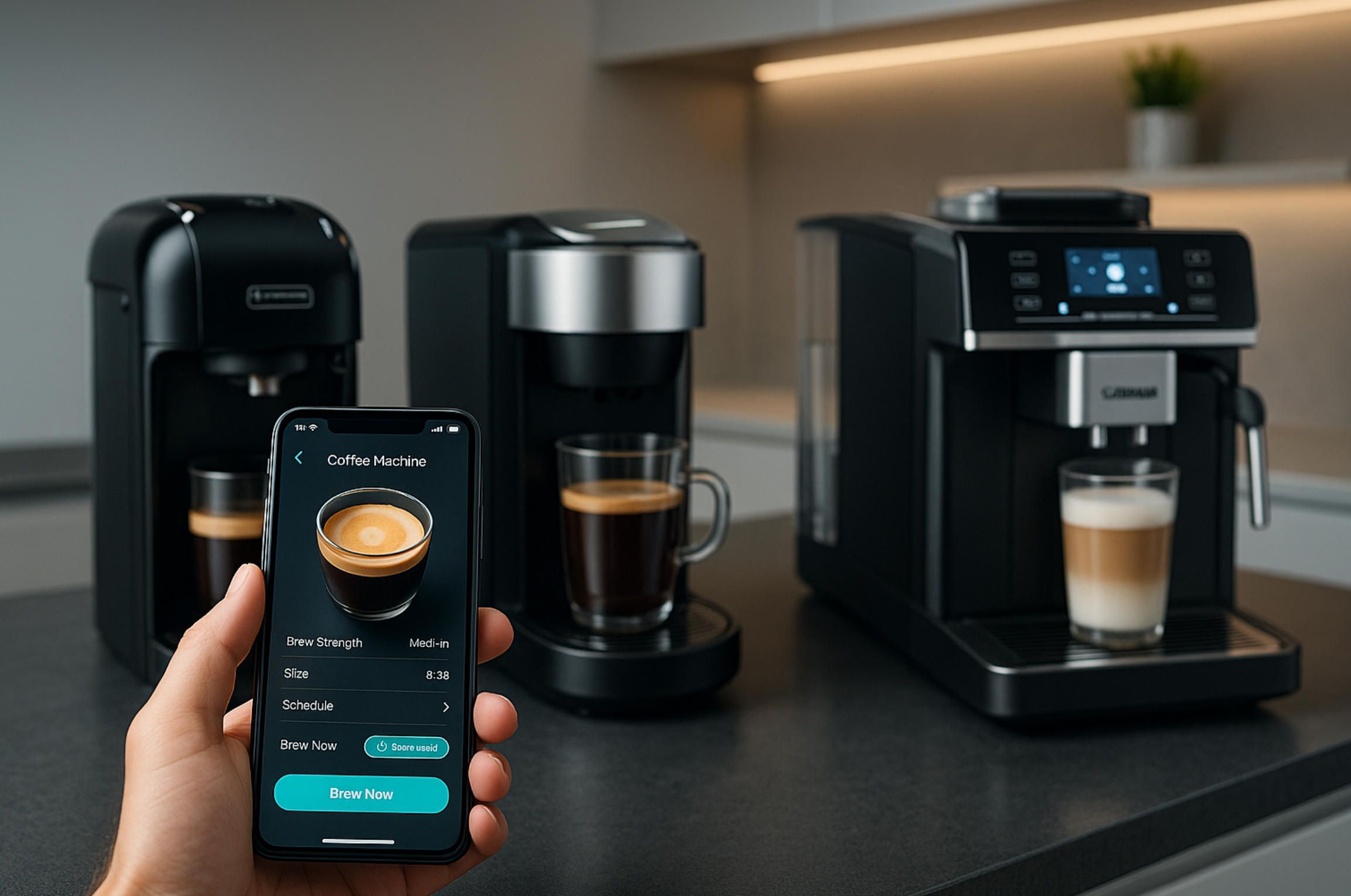
1. Popular App Controlled Coffee Machines: Market Overview
The concept of an app controlled coffee maker has shifted from novelty to mainstream over the past decade. What was once an experimental feature reserved for luxury appliances has now become a competitive requirement across multiple markets — from high-end espresso machines to compact single-serve brewers. These machines allow consumers to start brewing from their phone, receive maintenance alerts, or even download new recipes from the cloud. Below we review the most notable devices shaping the industry today.
Nespresso Expert & App (Global, strong in Europe and the U.S.)
Nespresso has always marketed itself as a premium lifestyle brand, and its connected machines prove why. The Nespresso Expert series, combined with the company’s mobile application, enables users to adjust serving sizes, temperature profiles, and brewing times. What stands out is the integration with the Nespresso capsule ecosystem: the app tracks capsule consumption and allows re-ordering with one tap. This seamless blend of hardware, software, and e-commerce demonstrates how an app controlled coffee machine can extend far beyond convenience into brand loyalty and direct sales channels.
Keurig K-Supreme Plus SMART (United States)
In North America, Keurig dominates the single-serve coffee market, and the K-Supreme Plus SMART is its flagship connected brewer. The app’s “BrewID” technology recognizes each K-Cup pod and recommends optimal brewing settings automatically. Users can save favorite recipes, manage schedules, and even control the coffee maker remotely from their phone. For many households, this is their first experience with an app controlled coffee maker you can control from a phone, making Keurig’s role critical in driving mainstream adoption in the U.S.
Smarter Coffee 2nd Generation (United Kingdom)
Smarter, a UK-based company, was one of the pioneers of the coffee maker with app control concept. Their 2nd generation Smarter Coffee product emphasizes simplicity: users can start brewing before they get out of bed, adjust strength and cup size, and sync the machine with other smart home devices. What makes this product unique is its integration with IFTTT (If This Then That), enabling advanced automation like “start brewing when my alarm turns off.” This degree of openness shows how app controlled espresso machines can fit naturally into a broader IoT ecosystem.
Siemens EQ.9 connect (Germany/Europe)
Siemens brings German engineering into the smart coffee arena with its EQ.9 connect series. These machines are designed for enthusiasts who want barista-level precision. The companion app offers advanced customization, allowing multiple user profiles, temperature curves, and even milk frothing adjustments. In Europe, where espresso culture dominates, Siemens appeals to households that want a professional coffee experience combined with app-based convenience. By linking to Wi-Fi rather than just Bluetooth, Siemens sets the stage for features like remote diagnostics and cloud-based updates, something traditional machines cannot offer.
Jura Smart Connect (Switzerland/Global)
Jura, famous for high-end espresso machines, takes a slightly different approach. Instead of embedding Wi-Fi into every machine, it offers the Smart Connect Bluetooth dongle that transforms compatible models into app controlled espresso machines. Through the Jura app, users can program specialty coffees, monitor cleaning cycles, and even analyze statistics about their coffee consumption. The modular nature of this solution — where a traditional machine becomes a connected one with a small accessory — reflects a transitional path for brands that want to modernize without redesigning their entire product line.
Common Strengths and Limitations Across the Market
Across all these examples, the coffee machine with app control provides clear value: personalization, remote operation, and integration with broader ecosystems. However, limitations remain. Many apps are locked to a brand’s hardware ecosystem, offering little flexibility for third-party integration. Features like AI recommendations, wellness tracking, or open APIs for restaurant systems are rare. Additionally, security and privacy remain under-discussed topics: users often grant permissions to apps without transparency on how data is processed.
Why This Market Overview Matters for Developers
The current generation of app controlled coffee machines demonstrates that the hardware is ready and the consumer demand is strong. Yet, the software side often feels one-size-fits-all. Manufacturers and startups have an opportunity to go beyond capsule tracking and scheduling by commissioning custom mobile app development. This is where companies like A-Bots.com bring value — filling the gaps left by existing solutions.
A-Bots.com can design an app that not only connects a coffee maker with app control but also integrates with loyalty programs, wearable devices, or restaurant management systems. By analyzing what leading brands do well — and where they fall short — businesses can strategically position themselves with smarter, more engaging mobile experiences.
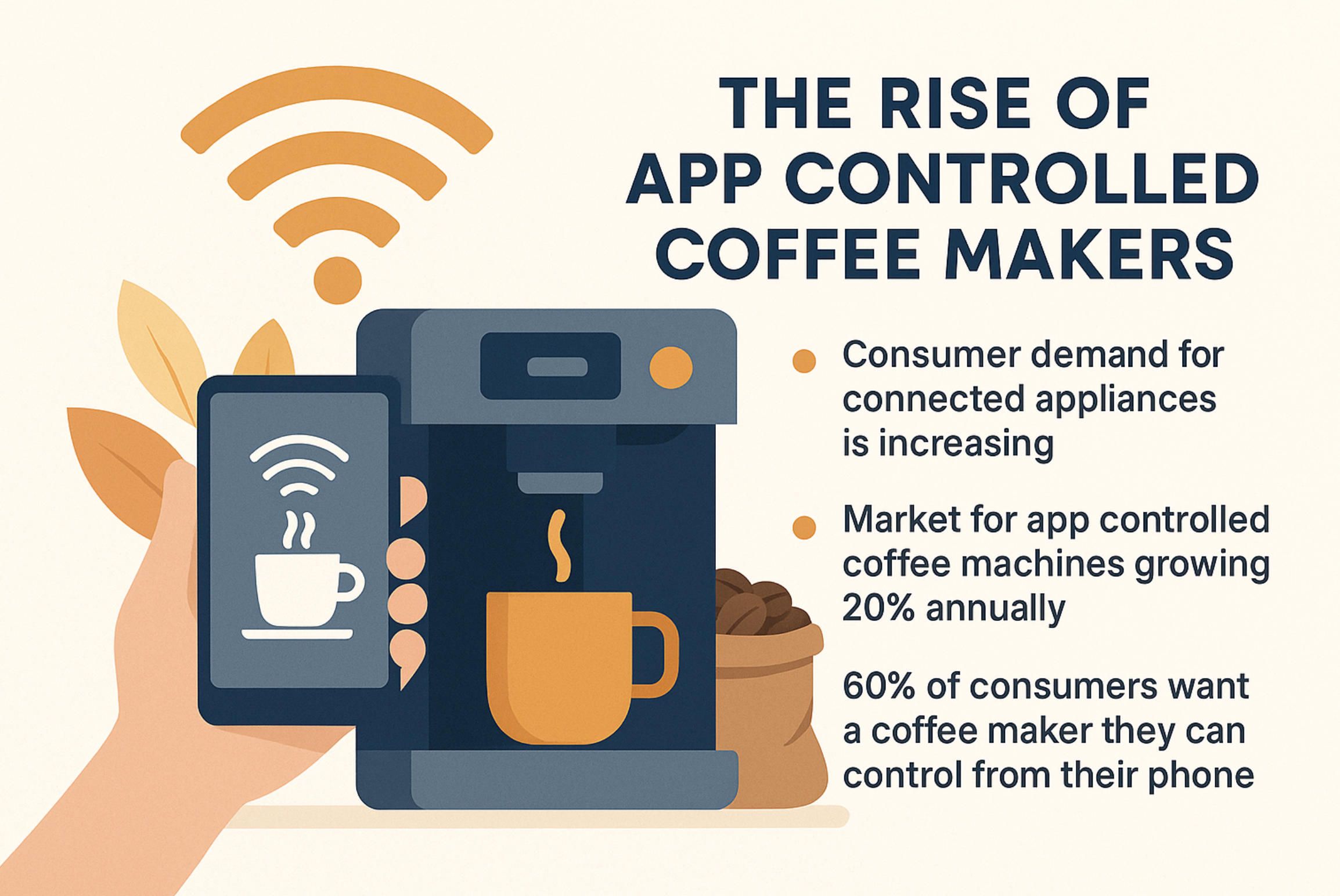
2. The Rise of App Controlled Coffee Makers
The story of the app controlled coffee maker is not simply about adding Bluetooth to a brewing device. It reflects broader trends in consumer technology, shifting lifestyles, and the growing expectation that every appliance should be “smart” and responsive to mobile control. To understand why these machines have gained momentum, we need to look at both the technological foundations and the cultural drivers that created demand.
From Buttons to Apps: The Historical Context
Traditional coffee machines evolved slowly. First came mechanical drip brewers, then programmable models with digital timers. By the early 2000s, convenience had become the dominant selling point: consumers wanted pod-based systems, one-touch espresso, and automatic milk frothers. Yet, as smartphones reshaped daily habits, a gap became visible. People were using their phones to unlock cars, adjust thermostats, and monitor fitness. The idea of a coffee maker you can control from a phone seemed like the logical next step.
The first prototypes appeared around 2012, often as crowdfunded projects. Many were experimental and clunky, limited by early Bluetooth protocols. But as Wi-Fi modules became cheaper and cloud computing more accessible, larger brands recognized the opportunity. By the late 2010s, companies like Nespresso, Keurig, and Siemens had launched their own coffee machines with app control, signaling that the trend was here to stay.
Market Growth and Adoption
According to recent market research, the global smart kitchen appliance industry is projected to exceed $60 billion by 2030, with app controlled coffee machines among the fastest-growing categories. Analysts estimate a compound annual growth rate (CAGR) of 17–20% for connected coffee devices between 2024 and 2030.
Adoption patterns differ by region. In the U.S., the single-serve app controlled coffee maker is favored for its convenience, often linked to pod ecosystems like Keurig. In Europe, the app controlled espresso machine is more popular, reflecting the cultural importance of espresso and cappuccino traditions. Meanwhile, in Asia, particularly South Korea and Japan, the appeal lies in integration with broader smart home platforms, where consumers already expect devices to sync with IoT hubs.
Cultural Drivers of Demand
The rise of coffee makers with app control is tied to more than technology; it reflects a cultural redefinition of coffee drinking. Several key drivers include:
-
Personalization as a Lifestyle Standard
Consumers no longer want generic brewing options. Just as Spotify curates playlists and Netflix personalizes recommendations, coffee drinkers expect apps to remember their preferences, from brew strength to temperature. -
Time Efficiency and Remote Control
In modern households, mornings are hectic. The ability to start an app controlled coffee machine from bed or schedule a brew before arriving home saves minutes that add up across weeks and months. -
Integration with Wellness and Data Tracking
As wearables track heart rate, sleep, and caffeine intake, linking a coffee maker with app control to health platforms becomes increasingly relevant. Consumers view their daily coffee not only as a ritual but also as part of an optimized lifestyle. -
Eco-consciousness and Transparency
Many apps now provide data on water usage, capsule recycling, or energy efficiency. This aligns with broader sustainability trends, making smart coffee machines attractive to environmentally aware buyers.
Technology as an Enabler
Behind the rise of app controlled espresso machines lies a set of enabling technologies:
- Bluetooth Low Energy (BLE) made local pairing affordable and efficient, allowing quick connections without draining power.
- Wi-Fi modules created remote access, so users could control coffee makers from outside the home.
- Cloud platforms enabled machine learning features such as brew optimization, predictive maintenance, and recipe libraries.
- Voice assistants like Alexa and Google Assistant opened a new channel of interaction, blending app control with hands-free voice commands.
Together, these advancements turned the simple act of brewing coffee into a connected experience that could rival the sophistication of other smart appliances.
Pandemic as a Catalyst
Another overlooked factor in the growth of coffee machines with app control was the COVID-19 pandemic. With coffee shops closed or restricted, consumers invested in higher-end home equipment. App-controlled models provided a bridge between the artisanal café experience and home brewing. Surveys in 2021–2022 showed a spike in premium coffee machine sales, with connected features cited as a differentiator. Even after restrictions lifted, the habit of brewing café-style coffee at home remained, sustaining demand.
Case Studies of Adoption
- Restaurants and Coffee Chains: Some chains experimented with app controlled coffee machines for consistency and integration with loyalty programs. Customers could pre-order via an app, and the machine would prepare the drink automatically upon arrival.
- Corporate Offices: Smart coffee systems allowed employees to customize drinks via their phones, reducing wait times and contact points.
- Smart Homes: In households already using smart speakers and lighting, adding a coffee maker with app control fit naturally into the ecosystem, reinforcing the “one app for everything” mentality.
Limitations Holding Back Wider Growth
Despite the enthusiasm, current adoption faces barriers:
- High upfront cost compared to traditional machines.
- Fragmented app ecosystems, with limited interoperability.
- Concerns about data privacy, especially when apps collect usage data tied to personal profiles.
- Occasional user frustration with connectivity issues, particularly in Bluetooth-only models.
These limitations underscore the need for custom mobile app development, where brands can solve pain points with tailored software rather than relying on generic solutions.
Outlook: Why the Rise Will Continue
The combination of cultural, technological, and behavioral trends suggests that the rise of app controlled coffee makers is still in its early stages. Future innovations may include:
- AI-driven taste profiling, adjusting recipes based on biometric data.
- Augmented reality (AR) tutorials guiding users through maintenance or latte art.
- Subscription models where the app manages bean or capsule deliveries automatically.
Manufacturers that embrace these possibilities will not only sell machines but also build ecosystems — with the app as the centerpiece. For businesses, the opportunity lies not just in hardware innovation but in partnering with companies like A-Bots.com to design the custom apps that will define the next generation of smart brewing.
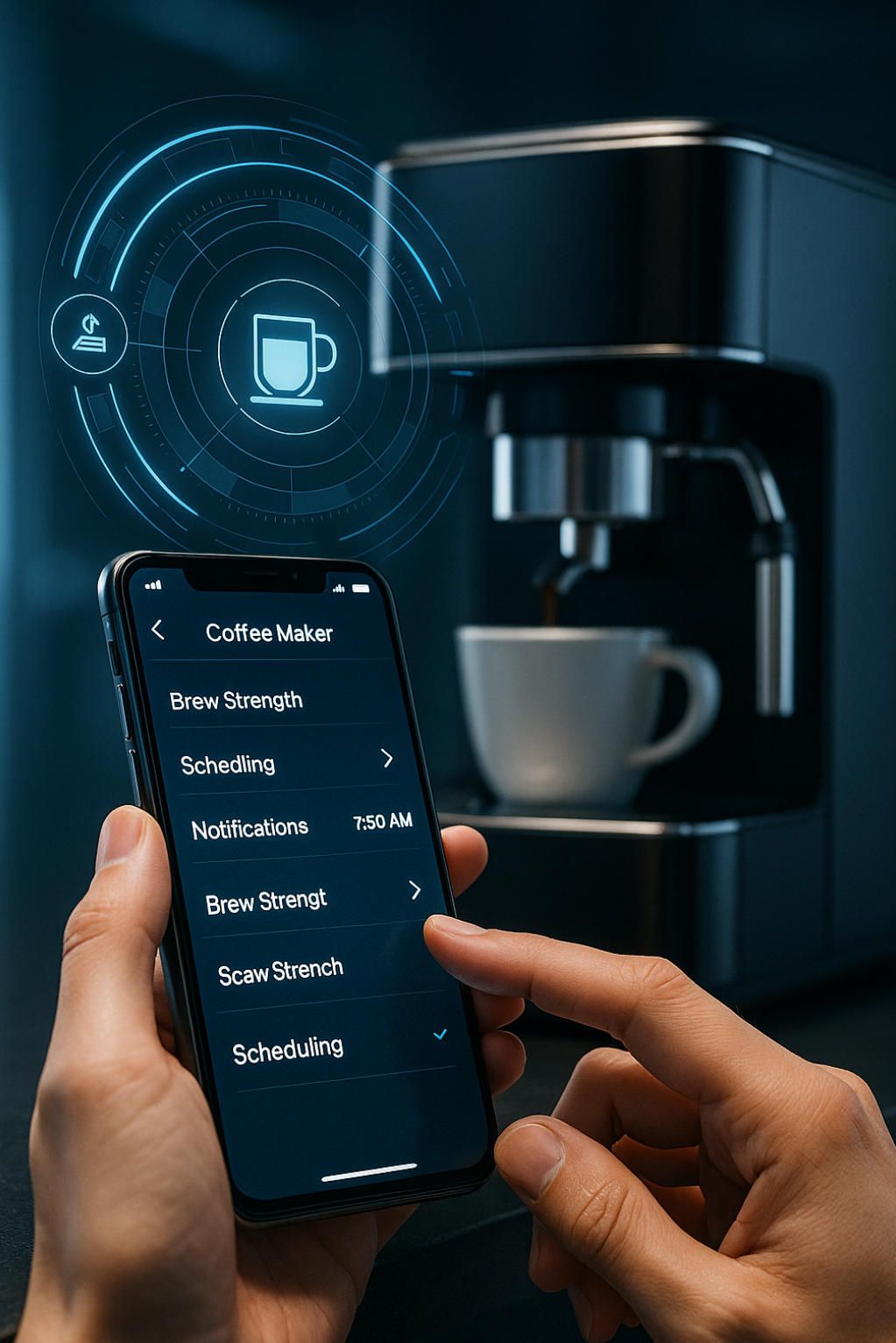
3. Core Features of a Coffee Machine with App Control
What separates an ordinary coffee machine from an app controlled coffee maker is not simply connectivity, but the depth of interaction the mobile app provides. For both consumers and manufacturers, the real value lies in the features that deliver convenience, personalization, and engagement. Below we explore the core capabilities that define a high-performing coffee machine with app control, and why they matter.
1. Remote Brewing and Scheduling
The most basic yet transformative feature is the ability to start brewing remotely. Whether through Wi-Fi or Bluetooth, users can initiate a coffee cycle without touching the machine. Many prefer the option to schedule a brew — for example, setting the machine to start five minutes before waking up. For office environments, scheduling ensures that the first employees arriving in the morning are greeted with fresh coffee. This functionality turns a coffee maker you can control from your phone into a true lifestyle upgrade.
2. Personalized Profiles and Recipes
One of the strongest appeals of an app controlled espresso machine is the ability to save preferences. An app can store multiple profiles, adjusting brew strength, temperature, water-to-coffee ratio, and milk frothing details for each user. Families benefit when everyone can save their perfect drink, while cafés and restaurants can standardize recipes for consistent quality. Some advanced apps even suggest new recipes based on past behavior, creating a sense of discovery similar to streaming platforms.
3. Voice Assistant and Smart Home Integration
Mobile apps act as the bridge between a coffee maker and the broader smart ecosystem. Through integration with Alexa, Google Home, or Siri Shortcuts, users can prepare coffee with simple voice commands: “Alexa, make my cappuccino.” This hands-free approach appeals to multitaskers and strengthens the positioning of a coffee machine with app control as a fully integrated IoT device. Beyond voice, apps can also connect coffee machines to home automation routines: brewing starts when the alarm goes off, or when smart blinds open.
4. Real-Time Notifications and Alerts
Another core feature is proactive communication. A well-designed app notifies users when beans or water are low, when descaling is required, or when maintenance cycles are due. This reduces frustration, extends machine lifespan, and adds value to the ownership experience. For commercial clients — such as restaurants and offices — predictive maintenance alerts prevent downtime, ensuring smooth operations.
5. Consumption Tracking and Analytics
With connected apps, coffee consumption becomes measurable. Users can track how many cups they brew per day, monitor caffeine intake, or analyze trends over weeks. When integrated with health apps or wearables, the data can be cross-referenced with sleep patterns or productivity cycles. For businesses, analytics can reveal which recipes are most popular, informing purchasing decisions for beans, pods, or syrups.
6. E-Commerce Integration
A significant business opportunity lies in embedding commerce directly into the app. Nespresso already demonstrated this with capsule reordering, but the model can expand further. Imagine a coffee maker with app control that suggests when to restock beans, offers subscription packages, or links to exclusive roast profiles. For manufacturers, this creates a continuous revenue stream rather than a one-time hardware sale.
7. Advanced Machine Diagnostics
Mobile apps can act as diagnostic dashboards, providing insights into machine performance. From monitoring pump pressure and grinder performance to checking water hardness, diagnostics help users troubleshoot quickly. In commercial settings, apps can send reports directly to service providers, reducing downtime. With cloud integration, manufacturers can even roll out firmware updates or new recipes remotely, extending the machine’s lifecycle.
8. Multi-Device Synchronization
Modern consumers often own more than one coffee device: a pod machine at home, a professional espresso unit at the office, perhaps even a portable brewer for travel. A forward-looking app controlled coffee maker ecosystem synchronizes across devices, storing preferences in the cloud and ensuring consistency. This capability also paves the way for loyalty programs that reward users for brewing across multiple touchpoints.
9. Sustainability and Eco Features
As sustainability becomes a purchase driver, apps play an essential role in communicating eco-impact. They can show how much energy the machine saves in eco-mode, track capsule recycling, or guide users toward sustainable brewing habits. This transparency adds brand value and aligns with global trends in responsible consumption.
The UX Factor: Why Software Matters More Than Hardware
While hardware determines brewing quality, it is the app interface that defines the user experience. A clunky or unintuitive app can ruin even the most advanced machine. Conversely, a sleek, responsive mobile app can elevate a mid-range brewer to premium status. This is why manufacturers increasingly turn to specialized partners for custom app development: to ensure that their coffee maker with app control feels as intuitive as any top-rated mobile app in the App Store or Google Play.
Good UX design emphasizes:
- Minimal steps to start brewing.
- Clear visualizations for recipes and analytics.
- Seamless onboarding and machine pairing.
- Multilingual support for global markets.
The A-Bots.com Advantage in Feature Design
Many existing apps are functional but uninspired — often designed by hardware teams with limited mobile expertise. A-Bots.com specializes in bridging this gap. By focusing on mobile-first design principles, we ensure that every app controlled espresso machine not only works but delights users.
Our approach includes:
- Deep integration with IoT protocols (Bluetooth, Wi-Fi, MQTT).
- Custom APIs for ERP, CRM, or restaurant management systems.
- Scalable cloud backends for data analytics and personalization.
- Modular design for adding new features as machines evolve.
This kind of partnership transforms a coffee maker from a mere appliance into a connected ecosystem — one that fosters loyalty, generates recurring revenue, and meets modern consumer expectations.
Conclusion: Features as Differentiators
The success of a coffee machine with app control depends on more than just brewing performance. Consumers now evaluate machines based on how seamlessly they integrate into their digital lives. Features like scheduling, personalization, analytics, and commerce define competitive advantage. For brands, the challenge is not only implementing these features but doing so in a way that feels natural, engaging, and future-proof.
By partnering with a development company like A-Bots.com, manufacturers and startups can go beyond generic solutions and create truly innovative apps that differentiate their machines in a crowded market. In the world of smart appliances, the app is no longer an accessory — it is the product.
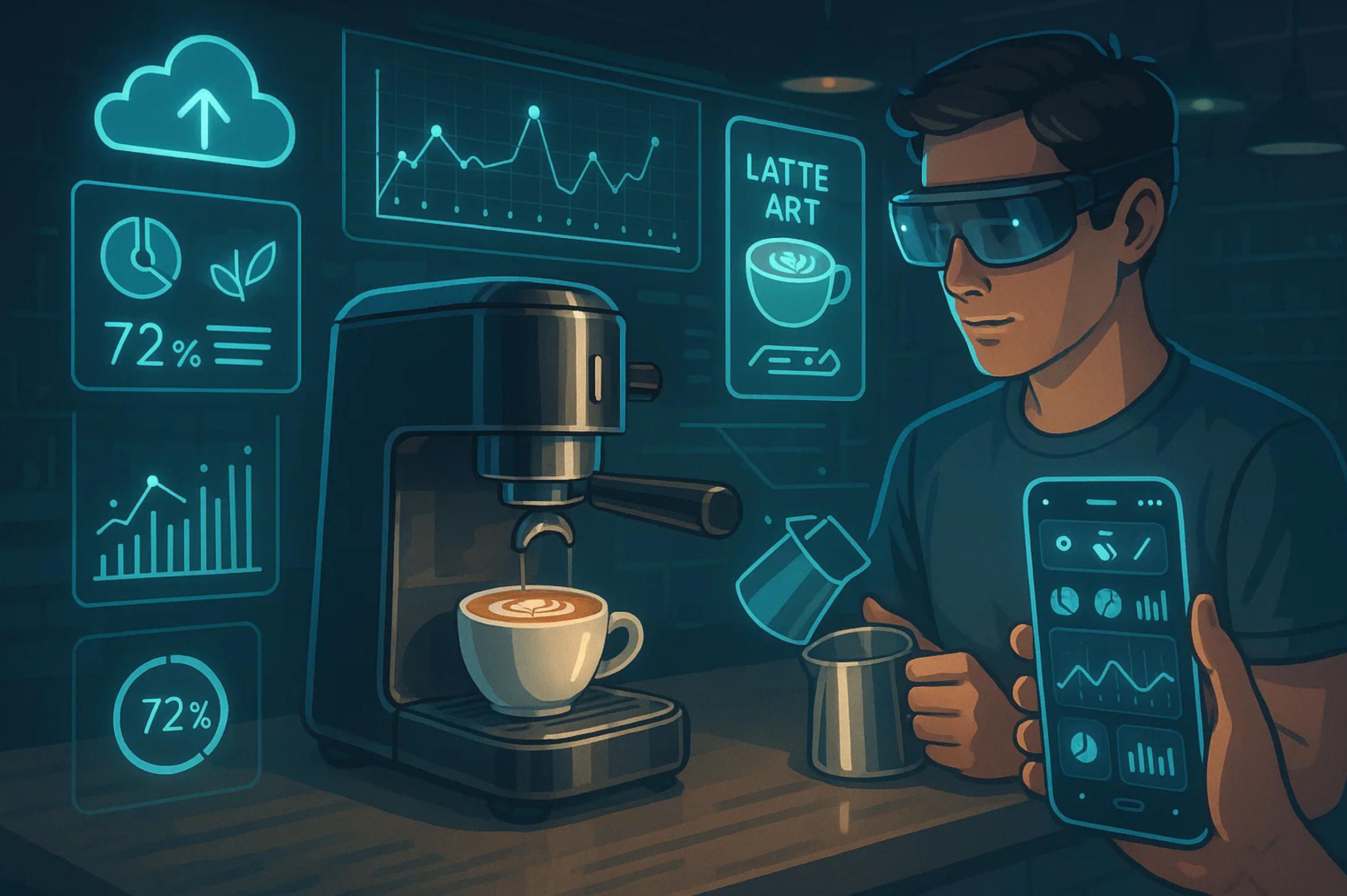
4. Future of App Controlled Espresso Machines
The evolution of the app controlled espresso machine is far from complete. What we see in today’s market — remote brewing, capsule tracking, and recipe personalization — is only the beginning. As digital ecosystems expand and consumer expectations rise, the coffee machine is poised to become more than a kitchen appliance. It will be a data-driven, health-aware, eco-friendly, and interactive platform that integrates into daily life with unprecedented sophistication.
AI-Driven Coffee Personalization
Artificial intelligence is already transforming retail, healthcare, and entertainment. Its next frontier is the coffee machine with app control. Imagine an AI barista that learns not only your preferred coffee strength but also adapts to subtle shifts in your lifestyle. If your wearable device shows you slept poorly, the app may suggest a stronger espresso shot. If your hydration tracker shows low water intake, the app could recommend a lighter brew. Over time, the app controlled coffee maker would not simply repeat instructions but evolve into a personalized wellness assistant.
Augmented Reality for Training and Maintenance
Augmented reality (AR) is another frontier. Many consumers find descaling or cleaning cycles confusing. With AR integration, users could point their phone camera at the machine and see step-by-step overlays guiding them through the process. Restaurants and offices with multiple machines could train staff more efficiently, reducing downtime. Beyond maintenance, AR might even enable latte art tutorials — projecting virtual guides for perfect milk frothing. This transforms a coffee maker you can control from your phone into an educational platform, not just a convenience tool.
IoT Ecosystem Integration
The future of smart appliances is not siloed but interconnected. Future app controlled coffee machines will connect to broader IoT ecosystems:
- Smart kitchens: coffee machines syncing with refrigerators to track milk or bean supplies.
- Energy grids: apps scheduling brewing when electricity rates are lowest, supporting sustainability goals.
- Workplace systems: machines integrated into office management apps, allowing employees to order coffee through a central platform.
Such integrations will shift coffee makers from isolated devices into nodes of a connected environment.
Health and Wellness Connectivity
Caffeine intake is increasingly scrutinized in wellness circles. Future apps may integrate with sleep trackers, glucose monitors, and productivity dashboards. Instead of manually logging caffeine, the app controlled espresso machine will automatically sync data into health apps. This creates opportunities for manufacturers to collaborate with fitness brands or healthcare providers, turning coffee consumption into part of a quantified lifestyle.
Sustainability and Transparency
Sustainability will remain a decisive factor in purchasing decisions. Future coffee machines with app control may include:
- Real-time energy and water usage dashboards.
- Automated capsule recycling reminders, with QR codes linking to recycling stations.
- “Green brew modes” that optimize temperature and extraction while reducing power consumption.
By making sustainability measurable and transparent, apps empower consumers to feel part of a larger ecological movement. For manufacturers, this builds trust and long-term loyalty.
Cloud Marketplaces for Coffee Recipes
Just as smartphones have app stores, the future may hold “brew stores.” Through cloud-connected apps, users could download signature recipes from coffee shops or baristas worldwide. An app controlled coffee maker could then reproduce those recipes precisely at home. For brands, this opens a new business model — selling digital coffee experiences as easily as music or video content. A-Bots.com foresees this trend and is already designing modular app architectures to accommodate recipe marketplaces.
Predictive Maintenance and Digital Twins
Maintenance remains a common pain point. The future lies in predictive systems that monitor machine performance in real time, alerting users before breakdowns occur. Going further, digital twin technology — a virtual replica of the coffee machine — could simulate wear and tear, predicting when components need service. For commercial users, this drastically reduces downtime. For home users, it makes ownership stress-free.
Security and Data Privacy
As coffee makers with app control collect more personal data — from caffeine intake to health metrics — security becomes a critical concern. The next generation of apps must adopt encryption, anonymization, and transparent consent models. Manufacturers who fail to address these concerns risk losing consumer trust. A-Bots.com recognizes this challenge and designs apps with data privacy as a foundational principle, ensuring compliance with global standards like GDPR and CCPA.
Opportunities for Businesses
For manufacturers, the future of app controlled espresso machines is about more than adding flashy features. It’s about building ecosystems that drive recurring revenue and long-term engagement. Opportunities include:
- Subscription models for beans, pods, or recipes.
- Partnerships with cafés and roasters for exclusive digital content.
- Data-driven insights for product development and marketing.
In this model, the app is not an accessory but the primary channel for customer interaction — the “face” of the brand.
Why Custom Development Will Be Key
Off-the-shelf apps cannot deliver the depth of personalization, integration, and security that the future demands. Brands that rely solely on generic solutions will quickly fall behind as consumer expectations accelerate. This is why partnering with an expert app development company like A-Bots.com becomes essential.
With experience in IoT, UX, cloud systems, and AI-driven personalization, A-Bots.com builds apps that not only control machines but define their competitive edge. As the market evolves, the ability to adapt — to add AR, to launch recipe marketplaces, to integrate with wellness platforms — will determine which coffee machine brands lead and which fade into obscurity.
Conclusion: From Machine to Ecosystem
The future of app controlled coffee makers is about transformation. No longer just appliances, these machines will become ecosystems of personalization, sustainability, and digital engagement. For consumers, this means richer, healthier, and more sustainable coffee experiences. For businesses, it means entirely new business models built around recurring revenue, customer loyalty, and data insights.
In this landscape, those who invest in custom mobile app development today will be the ones defining tomorrow’s coffee culture. And with A-Bots.com as a partner, brands can be confident that their coffee machine with app control will not only meet expectations but shape the future of smart brewing.
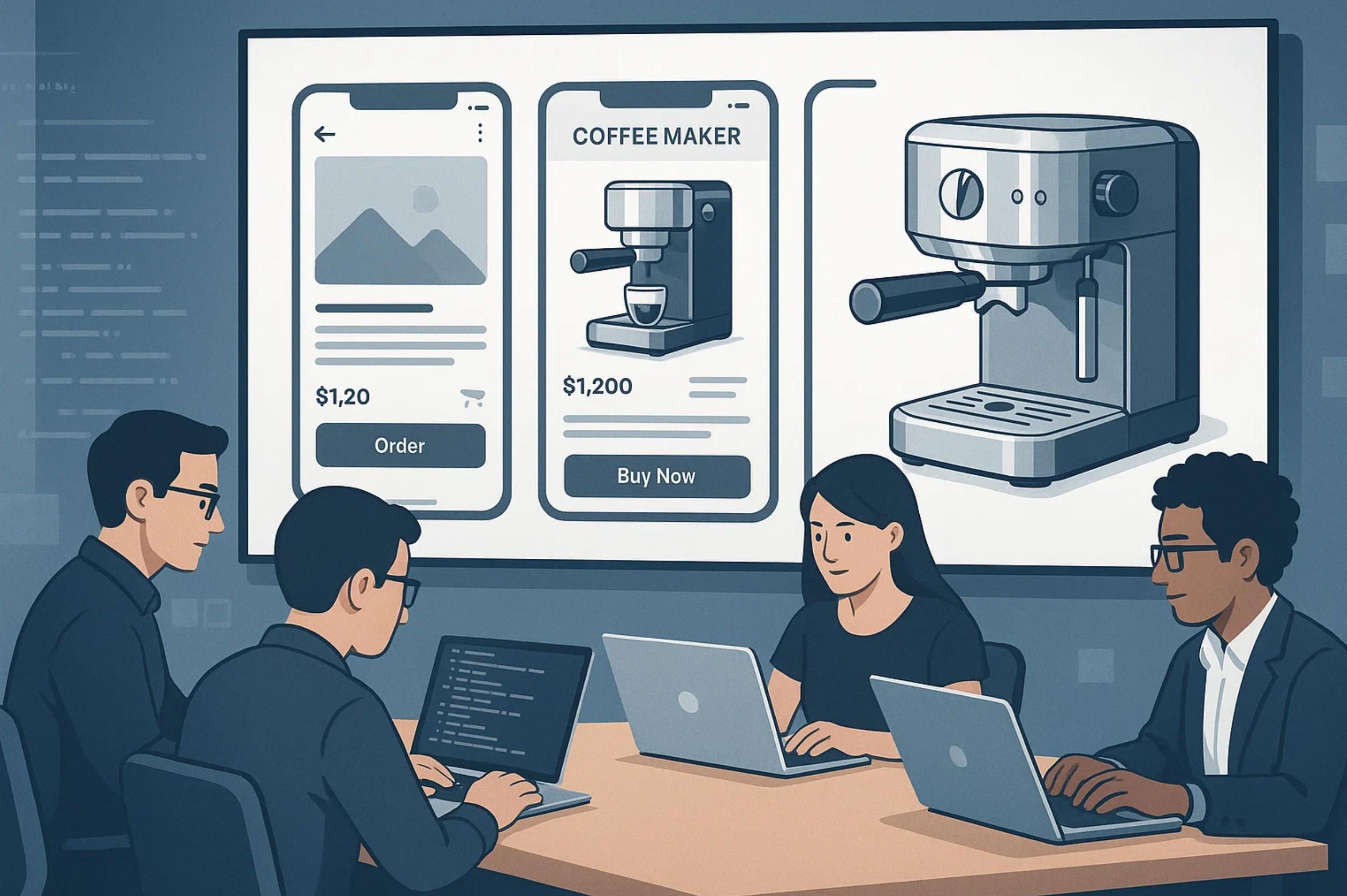
5. Why Custom Development Matters — and How A-Bots.com Helps
The growth of the app controlled coffee maker market proves that consumers want smarter, more connected brewing experiences. But as the landscape evolves, it also reveals a crucial reality: off-the-shelf mobile apps can only go so far. For brands seeking differentiation, flexibility, and long-term loyalty, custom mobile app development is not just an advantage — it is a necessity.
The Limitations of Generic Solutions
Most manufacturers today either build simple companion apps in-house or license third-party platforms. While these solutions are functional, they come with limitations that restrict innovation:
- One-size-fits-all design: Generic apps rarely reflect the unique identity of a brand. They offer limited customization for branding, UX flows, or localized features.
- Shallow integration: Off-the-shelf apps often handle only basic tasks like starting a brew or tracking capsules. They cannot connect seamlessly with CRM systems, restaurant management tools, or loyalty programs.
- Scalability issues: As new features such as AR tutorials or AI recommendations emerge, generic platforms struggle to adapt.
- Lack of ownership: When relying on third-party vendors, manufacturers often lose control of data insights, updates, and even customer relationships.
These limitations mean that while a machine may technically qualify as a coffee maker with app control, it fails to deliver the depth of engagement modern users expect.
The Value of Custom App Development
A custom app controlled espresso machine is more than a convenience feature. It becomes the digital identity of the brand — the primary interface between consumer and company. Custom development delivers several key benefits:
-
Brand Differentiation
A tailor-made app reflects a brand’s values, design language, and personality. From UI colors to tone of notifications, everything can reinforce brand identity. -
Deeper Customer Engagement
Features like gamified coffee challenges, loyalty rewards, or curated recipe libraries keep users returning. A bespoke app is a customer retention tool as much as a control panel. -
Seamless Integration
Businesses can integrate the app into existing ecosystems — whether that means ERP software for inventory management, payment gateways for subscription models, or APIs for smart home platforms. -
Monetization Opportunities
With custom solutions, manufacturers can explore revenue streams beyond machine sales. In-app subscriptions for coffee beans, recipe marketplaces, or premium features all become viable. -
Future-Proofing
A modular architecture ensures new technologies — AI, AR, blockchain-based supply chains — can be integrated without rebuilding the entire platform.
A-Bots.com: Turning Coffee Machines Into Digital Experiences
This is where A-Bots.com stands out. As a dedicated mobile app development company, we specialize in designing bespoke solutions for IoT and smart appliances, including coffee makers you can control from your phone. Our approach goes beyond simple connectivity. We focus on building apps that become strategic assets for our clients.
-
IoT Expertise: Our engineers understand the protocols behind Bluetooth Low Energy, Wi-Fi, MQTT, and cloud APIs, ensuring that your coffee machine with app control communicates reliably and securely.
-
User-Centric UX Design: We design interfaces that are intuitive for first-time users yet powerful enough for enthusiasts. From onboarding to advanced analytics, every detail is crafted for engagement.
-
Data & AI Integration: Our team builds platforms capable of capturing usage data, running predictive analytics, and delivering personalized recommendations. This creates a virtuous cycle of customer insight and product improvement.
-
Security by Design: With rising concerns over data privacy, A-Bots.com embeds encryption and compliance with GDPR, CCPA, and other regulations into every project.
Use Cases: Beyond Home Kitchens
The impact of custom app controlled coffee makers extends into multiple domains:
-
Restaurants and Cafés: Custom apps can link brewing equipment with point-of-sale systems, loyalty programs, or delivery apps, ensuring consistent quality while enhancing customer interaction.
-
Corporate Offices: Businesses can offer employees personalized drinks via mobile profiles, reducing wait times and fostering workplace satisfaction.
-
Hospitality Industry: Hotels can integrate coffee machine apps with room service or guest apps, enabling guests to order or schedule drinks without leaving their beds.
-
Vending Solutions: Custom apps for vending coffee machines can support mobile payments, subscription models, or real-time stock monitoring.
Each scenario highlights how a coffee maker with app control is not just a gadget — it becomes part of a larger digital ecosystem.
A Strategic Investment, Not a Cost
Some manufacturers hesitate to commission custom apps, worrying about initial costs. But in reality, custom mobile app development pays for itself by driving differentiation, loyalty, and recurring revenue. Consider the following:
- A unique app can command higher machine prices in the market.
- Integrated commerce features generate continuous sales of beans, pods, or accessories.
- Predictive maintenance reduces warranty claims and service costs.
- Strong apps create brand stickiness, reducing churn to competitors.
In essence, custom apps transform the business model from transactional (selling machines once) to relational (maintaining ongoing customer engagement).
Why Partner With A-Bots.com
At A-Bots.com, we understand that building an app controlled coffee maker is not just a technical challenge — it is a brand strategy. We combine technical expertise with design thinking to deliver mobile solutions that truly matter. Our process is collaborative:
- Discovery Workshops: We align app goals with brand vision.
- Prototyping & UX Testing: Early feedback ensures apps are intuitive before full development.
- Agile Development: Iterative releases bring features to market faster.
- Post-Launch Support: From analytics dashboards to feature expansions, we stay engaged long after launch.
By partnering with us, manufacturers and startups can transform a coffee machine into a flagship digital experience, ensuring their product doesn’t just follow trends but sets them.
Final Word: Building the Future of Coffee
The rise of app controlled espresso machines is reshaping how people experience coffee. But the winners in this market will not be the companies with the fanciest hardware alone. They will be the brands that recognize the power of software — the apps that create ongoing, meaningful connections with consumers.
A-Bots.com is ready to help manufacturers, cafés, and innovators seize this opportunity. With our expertise in IoT, UX, AI, and secure development, we can build the mobile solutions that turn a coffee maker you can control from your phone into a lifestyle platform, a business channel, and a brand differentiator.
In a world where the app is often more important than the machine itself, investing in custom development is not optional — it is the key to long-term success. With A-Bots.com as your partner, that future is within reach.
✅ Hashtags
#AppControlledCoffeeMaker
#CoffeeMachineWithAppControl
#SmartCoffeeMachine
#AppControlledEspressoMachine
#CoffeeMakerFromPhone
#IoTAppDevelopment
#MobileAppForCoffeeMakers
#CustomAppDevelopment
#SmartBrewing
#ABots
Other articles
Custom Coffee Machine App Development Smart coffee is no longer just about flavor — it's about experience. Discover how custom mobile apps for coffee machines unlock new revenue streams, elevate user engagement, and enhance brand loyalty. Backed by real IoT projects, A-Bots.com delivers world-class app solutions that blend tech with taste. Brew the future with us.
Custom Mobile App Development for Smart Wine Cabinets Smart wine cabinets are revolutionizing how wine is stored, served, and experienced. But without a tailored mobile app, their potential remains untapped. This article explores how custom app development turns connected appliances into lifestyle platforms. From inventory tracking and AI-powered recommendations to enterprise-grade restaurant integrations, the right app changes everything. We cover technical architecture, design principles, and real-world use cases. Whether you're a wine lover, hotelier, or hardware brand, you'll discover why mobile UX is now core to wine storage. A-Bots.com delivers expert, future-ready solutions tailored to this niche.
Mobile App Development for Scales Smart scales have evolved into intelligent health companions, offering far more than weight data. Today’s users demand full-body insights, AI-driven feedback, and smooth integration with other devices. This article explores how mobile apps transform smart scales into personalized wellness ecosystems. We analyze the market growth, user expectations, and technical architecture needed for success. Real-world case studies and forward-looking trends are covered in depth. We also reveal why brands must prioritize custom software over generic solutions. If you're building the future of digital health, it starts with your app.
Mobile Apps for Smart Air-Fryer and Oven Air-fryers and connected ovens are selling fast, but the real profit sits in software. A well-designed app can upsell recipe bundles, push firmware with new “modes,” and collect usage data that refines heat curves. This article breaks down the $8-billion smart-kitchen surge and shows how subscription cooking content outpaces hardware margins. Readers will learn why cloud analytics, AI doneness detection, and grocery-API tie-ins win customer loyalty. We’ll detail technical architecture—BLE pairing to edge-AI temp control and secure OTA pipelines. Real-world case studies reveal both triumphs and missed opportunities. Finally, we explain why manufacturers partner with A-Bots.com to cook up recurring revenue.
Apple Watch for Seniors: Custom Apps and Elder-Care Solutions The phrase apple watch for seniors reflects a growing global trend: using wearables to improve safety, health, and independence for older adults. With Fall Detection, SOS alerts, ECG readings, and medication reminders, Apple Watch already supports elder care. Yet true transformation comes from custom solutions. Tailored watchOS and iOS apps can provide predictive fall-risk monitoring, caregiver dashboards, medication adherence alerts, and seamless integration with clinical systems. For insurers, senior-living providers, and startups, this is not just a technical upgrade but a strategic opportunity in rapidly aging societies where one in five citizens is already over 65. A-Bots.com, with expertise in custom apple watch app development, bridges technology, compliance, and human-centered design. The result is wearable solutions that seniors trust, caregivers depend on, and organizations can scale with confidence.
Mobile App Development for Restaurants | A-Bots.com In today’s digital dining landscape, mobile app development for restaurants is essential. Customers expect apps that manage reservations, ordering, delivery, and loyalty in one seamless flow. Generic templates cannot compete with leaders like Starbucks or Domino’s. A-Bots.com is a trusted restaurant app development company creating bespoke solutions that integrate POS systems, payments, AI personalization, and IoT kitchens. Our expertise allows restaurants to build restaurant apps that increase efficiency, loyalty, and revenue. From boutique cafes to global franchises, we design apps as living systems that adapt to customer behavior and technology trends. Partner with A-Bots.com to create restaurant apps that deliver lasting impact and redefine the dining experience.
App Controlled Coffee Maker: Custom App Development The coffee industry is rapidly embracing connectivity, with app controlled coffee makers and espresso machines becoming central to the smart kitchen revolution. Consumers expect to control brewing, personalize recipes, and monitor devices directly from their phones. Off-the-shelf solutions rarely meet these needs. That’s why A-Bots.com specializes in custom mobile app development for coffee machines with app control. From IoT integration and predictive maintenance to AI-driven personalization and sustainability dashboards, our apps transform coffee makers into digital ecosystems. For manufacturers, restaurants, and startups, this is more than software — it’s a strategic tool for customer loyalty and recurring revenue. Partner with A-Bots.com to shape the future of smart brewing.
Top stories
Copyright © Alpha Systems LTD All rights reserved.
Made with ❤️ by A-BOTS
